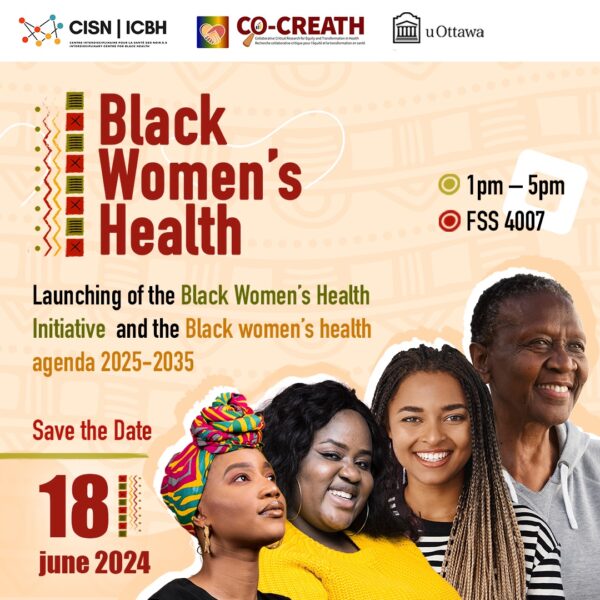In an unprecedented move, experts in the field of Black women’s health have launched ambitious health plans called the Black Women’s Health Agenda for the decade spanning 2025–2035 and the Black Women’s Health Initiative.
The Black Women Health Hybrid Conference held at the Faculty of Social Sciences at the University of Ottawa is aimed at addressing the most pressing health issues affecting Black women in Canada with a focus on creating a socially just society where optimal health and well-being are a reality for all. At the launch, Josephine Etowa, a Professor of Nursing at the University of Ottawa, said during her presentation, “Within the Black population, gender and other intersecting social identities shape experiences and impact the health and wellbeing of Black people.

Etowa said African, Caribbean, and Black (ACB) people in Ontario are overrepresented among HIV cases of known race or ethnicity. Adding to that, ACB women comprised 59 percent of first-time diagnoses among women in 2019 and 44 percent of first-time diagnoses among women in 2020, which is followed by 31 percent White and 13 percent Indigenous.
Her presentation further exposes the inequality in HIV diagnoses, as Black people annually account for one of every four new diagnoses, while stating that Black people living with HIV have a higher mortality rate than their White counterparts.
“This overrepresentation is believed to be in part due to socioeconomic and structural factors such as HIV-related stigma, gender discrimination, and anti-Black racism, which converge to increase the vulnerability of HIV infection by reducing access to HIV prevention,” Etowa said.
The Professor of Nursing adds that the goal and objective of the initiative are to ignite and improve systems and structures that enable and support effective service design and delivery for Black women’s health and well-being, using high-quality evidence and race as well as gender transformative approaches.
As part of its long-term strategy, the Black Women’s Health Initiative plans to address the public health challenges of reproductive health, mental health, infectious diseases, and chronic diseases. Its research agenda aims to address the impact of anti-Black racism, social conditions, employment and working conditions, and gender discrimination.

At the panel discussion chaired by Sarah Onyango, Dr. Angela Kaida, Assistant Professor, Faculty of Health Sciences, Simon Fraser University, said that there are health disparities among Black women in Canada and that these disparities can be bridged by focusing on funding and equalization policies.
Kaida highlighted the importance of considering social determinants of health, particularly for racialized women, who face unique challenges in accessing healthcare. Emphasizing the need for a community-based approach to address the experiences of Black women in Canada rather than relying on individual representation.
The Assistant Professor who is the Scientific Director of the Canadian Institute of Health Research (CIHR) Institute of Gender and Health further highlighted the underrepresentation of women and racialized researchers in health research funding, stating that CIHR is carrying out an equalization policy aiming to address inequality in funding for racialized researchers.
Dr. Anika Hines, Assistant Professor, School of Medicine, Health Behaviour, and Policy, Virginia Commonwealth University, mentioned that in the US, disparities in maternal health result in cardiovascular issues, which in turn impact healthcare quality for Black women in the US.
She adds that historical and systemic racism affects health outcomes for Black women, pointing out that Black women are faced daily with chronic stressors, leading to higher rates of chronic diseases in the country. Hines proposed a research project to investigate the root causes of these health disparities, including structural and personal factors.
The next steps of action, Etowa said, include initiating a dialogue with Black women, ACB communities, experts in the field, and other stakeholders. Following this, Etowa announced a year-long Sisterhood for Health Equity, dubbed SHESpeaks National Conversations, to emphasize the importance of the Black Women’s Health Initiative.
The 10-year plan (2025–2023) research agenda is not just a plan; it is a promise—a promise to future generations of Black women and girls that their health and well-being are paramount. It is a commitment to building a Canadian health system where they can live their lives to the fullest, free from the health disparities that have long plagued their communities.
The experts in the field of Black women’s health stand at the forefront of this transformative journey, ready to lead the charge in making optimal health a reality for all Black women and girls. With this plan, Black researchers continue to highlight the resilience, power, and innovation of Black women, collaborating with them on their life-health journey and interpreting their lived experiences with hope and action.

